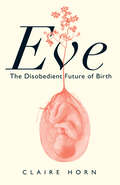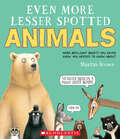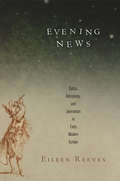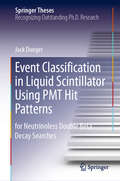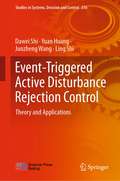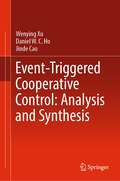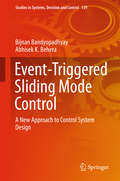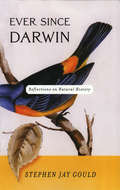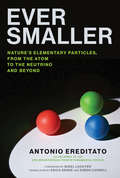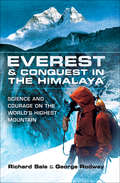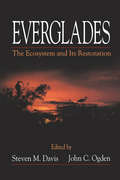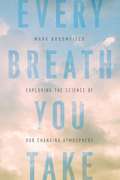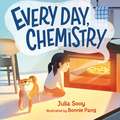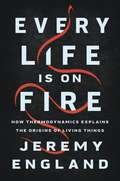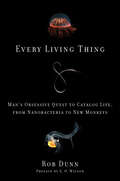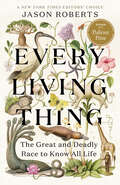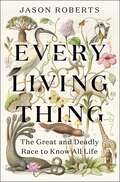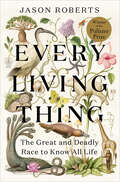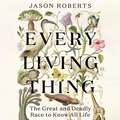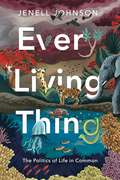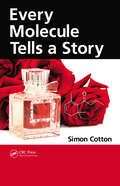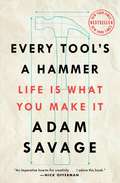- Table View
- List View
Eve: The Disobedient Future of Birth
by Claire HornA radical interrogation of the ethics and future of birth by an expert legal scholar. Every single one of us has been born from a person. So far. But that is about to change. For the first time, babies could be gestated and born from machines through “Ex-vivo Uterine Environment Therapy,” aka EVE. But such radical technology leaves us with complex legal, social, and ethical questions. What does this breakthrough in artificial human gestation mean for motherhood, womanhood, and parenthood? Countries and people that do not respect the autonomy of pregnant people may use these technologies to curtail choice further, advance eugenic ideas, or to deepen class and racial divides. In this fascinating story of modern birth, Claire Horn takes us on a journey from the first orchid-like incubators in the 1880s to the cutting-edge scientific breakthroughs of today. As she explores the most challenging and pertinent questions of our age, Horn reflects on her own pregnancy. Could artificial wombs allow women to redistribute the work of gestating? How do we protect reproductive and abortion rights? And who exactly gets access to this technology, in our vastly unequal world?
Even More Fizzle, Bubble, Pop & Wow!
by Lisa MurphyExcite young learners with this collection of more than 80 simple science experiments. Each activity promotes learning and requires materials that are likely already in your classroom or kitchen. Each fun activity includes simple instructions and a clear explanation of the experiment-and many include variations and helpful hints.
Even More Lesser Spotted Animals
by Martin BrownApproachable and funny, Even More Lesser Spotted Animals combines the humor and verve of Sandra Markle with the gorgeous presentation of picture books from Steve Jenkins and Diana Aston.Just as Lesser Spotted Animals showed you some of the wonderfully WOW wildlife we never get to see, the next book of the lesser known animal kingdom reveals the stories of even more of the world's unseen and unsung creatures. No king-of-the-jungle, fancy-pants, hair necked lions here -- we've got the magnificent maned wolf instead. No blue whales either, we've got beaked whales -- and lorises and dingisos and dibatags and many, many more.
Evening News
by Eileen ReevesEileen Reeves examines a web of connections between journalism, optics, and astronomy in early modern Europe, devoting particular attention to the ways in which a long-standing association of reportage with covert surveillance and astrological prediction was altered by the near simultaneous emergence of weekly newsheets, the invention of the Dutch telescope, and the appearance of Galileo Galilei's astronomical treatise, The Starry Messenger.Early modern news writers and consumers often understood journalistic texts in terms of recent developments in optics and astronomy, Reeves demonstrates, even as many of the first discussions of telescopic phenomena such as planetary satellites, lunar craters, sunspots, and comets were conditioned by accounts of current events. She charts how the deployment of particular technologies of vision--the telescope and the camera obscura--were adapted to comply with evolving notions of objectivity, censorship, and civic awareness. Detailing the differences between various types of printed and manuscript news and the importance of regional, national, and religious distinctions, Evening News emphasizes the ways in which information moved between high and low genres and across geographical and confessional boundaries in the first decades of the seventeenth century.
Evening's Empire
by Craig KoslofskyWhat does it mean to write a history of the night? Evening's Empire is a fascinating study of the myriad ways in which early modern people understood, experienced, and transformed the night. Using diaries, letters, and legal records together with representations of the night in early modern religion, literature and art, Craig Koslofsky opens up an entirely new perspective on early modern Europe. He shows how princes, courtiers, burghers and common people 'nocturnalized' political expression, the public sphere and the use of daily time. Fear of the night was now mingled with improved opportunities for labour and leisure: the modern night was beginning to assume its characteristic shape. Evening's Empire takes the evocative history of the night into early modern politics, culture and society, revealing its importance to key themes from witchcraft, piety, and gender to colonization, race, and the Enlightenment.
Event Classification in Liquid Scintillator Using PMT Hit Patterns: for Neutrinoless Double Beta Decay Searches (Springer Theses)
by Jack DungerThe search for neutrinoless double beta decay is one of the highest priority areas in particle physics today; it could provide insights to the nature of neutrino masses (currently not explained by the Standard Model) as well as how the universe survived its early stages. One promising experimental approach involves the use of large volumes of isotope-loaded liquid scintillator, but new techniques for background identification and suppression must be developed in order to reach the required sensitivity levels and clearly distinguish the signal. The results from this thesis constitute a significant advance in this area, laying the groundwork for several highly effective and novel approaches based on a detailed evaluation of state-of-the-art detector characteristics. This well written thesis includes a particularly clear and comprehensive description of the theoretical motivations as well as impressively demonstrating the effective use of diverse statistical techniques. The professionally constructed signal extraction framework contains clever algorithmic solutions to efficient error propagation in multi-dimensional space. In general, the techniques developed in this work will have a notable impact on the field.
Event-Triggered Active Disturbance Rejection Control: Theory and Applications (Studies in Systems, Decision and Control #356)
by Dawei Shi Ling Shi Yuan Huang Junzheng WangThe past few years have seen the attention and rapid developments in event-triggered sampled-data systems, in which the effect of event-triggered sensor measurements and controller updates is explored in controller analysis and design.This book offers the first systematic treatment of event-triggered sampled-data control system design using active disturbance rejection control (ADRC), an effective approach that is popular in both theoretic research and industrial applications. Extensive application examples with numerous illustrations are included to show how the event-triggered ADRC with theoretic performance guarantees can be implemented in engineering systems and how the performance can be actually achieved. For theoretic researchers and graduate students, the presented results provide new directions in theoretic research on event-triggered sampled-data systems; for control practitioners, the book offers an effective approach to achieving satisfactory performance with limited sampling rates.
Event-Triggered Cooperative Control: Analysis and Synthesis
by Jinde Cao Wenying Xu Daniel W. HoThe book provides a systematic and in-depth introduction to distributed event-triggered cooperative control for multi-agent systems from a theoretical perspective, which will be of particular interest to the readers. The included major research topics include: a unified design and analysis framework for centralized, clustered and distributed event-triggered schemes; fully distributed design for event/self-triggered schemes; resilient event-triggered control under malicious attacks; and various methods to aovid Zeno behavior. The comprehensive and systematic treatment of event-triggered communication and control in multi-agent system is one of the major features of the book, which is particularly suited for readers who are interested in learning principles and methods to deal with communication constraints in multi-agent systems and to design energy-saving control protocols. The book can benefit researchers, engineers, and graduate students in the fields of complex networks, smart grids, applied mathematics, electrical and electronic engineering, and computer engineering, etc.
Event-Triggered Sliding Mode Control: A New Approach To Control System Design (Studies In Systems, Decision And Control #139)
by Bijnan Bandyopadhyay Abhisek K. BeheraThis edited monograph provides a comprehensive and in-depth analysis of sliding mode control, focusing on event-triggered implementation. The technique allows to prefix the steady-state bounds of the system, and this is independent of any boundary disturbances. The idea of event-triggered SMC is developed for both single input / single output and multi-input / multi-output linear systems. Moreover, the reader learns how to apply this method to nonlinear systems. The book primarily addresses research experts in the field of sliding mode control, but the book may also be beneficial for graduate students.
Ever Since Darwin: Reflections in Natural History
by Stephen Jay GouldMore than any other modern scientists, Stephen Jay Gould has opened up to millions the wonders of evolutionary biology. His genius as an essayist lies in his unmatched ability to use his knowledge of the world, including popular culture, to illuminate the realm of science. Ever Since Darwin, Stephen Jay Gould's first book, has sold more than a quarter of a million copies. Like all succeeding collections by this unique writer, it brings the art of the scientific essay to unparalleled heights.
Ever Smaller: Nature's Elementary Particles, From the Atom to the Neutrino and Beyond
by Antonio EreditatoIdeas, theories, experiments, and unanswered questions in particle physics, explained (with anecdotes) for the general reader.The elementary particles of matter hold the secrets of Nature together with the fundamental forces. In Ever Smaller, neutrino physicist Antonito Ereditato describes the amazing discoveries of the "particle revolution," explaining ideas, theories, experiments, and unanswered questions in particle physics in a way that is accessible (and enjoyable) for the general reader. Ereditato shows us that physics is not the exclusive territory of scientists in white lab coats exclaiming "Eureka" but that its revelations can be appreciated by any reader curious about the mysteries of the universe.
Everest & Conquest in the Himalaya: Science and Courage on the World's Highest Mountain
by Richard Sale George RodwayA history of those who have scaled Mount Everest—and the advances in mountaineering over a century. At one time, the summits of the world&’s highest peaks—Everest included—were beyond reach. Pioneering attempts to overcome the dangers of climbing at extremely high altitudes ended in failure, sometimes with disastrous consequences. Yet today, high-altitude ascents are frequent, almost commonplace. Everest can be conquered by relatively inexperienced mountaineers, and their exploits barely merit media attention—unless they go fatally wrong. This dramatic history of Everest climbs describes in vivid detail the struggle to conquer the mountain and the advances in scientific knowledge that made the conquest possible. It also offers compelling insight into the science of mountaineering—as well as the physical and psychological challenges faced by individuals who choose to test themselves in some of the harshest conditions on earth.
Everglades: The Ecosystem and Its Restoration
by Steve Davis John C. OgdenThe 31 chapters provide a wealth of previously unpublished information, plus topic syntheses, for a wide range of ecological parameters. These include the physical driving forces that created and continue to shape the Everglades and patterns and processes of its flora and fauna. The book summarizes recent studies of the region's vegetation, alligat
Every Breath You Take: Exploring the Science of Our Changing Atmosphere
by Mark BroomfieldA leading authority in the field takes readers on a fascinating and surprising journey through the atmosphere—from our lungs to outer space—that will leave readers breathless.With seven million early deaths each year linked to air pollution, air quality is headline news around the world. But even though we breathe in and out every few seconds, few of us really know what&’s in the air all around us. In Every Breath You Take, air quality specialist—and full-time breather—Dr. Mark Broom connects the dots from the atmosphere on distant planets to the holes in the ozone layer to the particles in our lungs. How do we measure air pollution and what on earth is an odor panel? Why are property prices higher upwind of cities? And will our grandchildren inherit an atmosphere worth breathing? With keen insights on the atmospheric effects of climate change, industrial air pollution, and urbanization in the twenty-first century, Every Breath You Take combines the latest scientific research with Mark&’s personal stories to answer these questions and many more in a readable and surprising journey through the atmosphere.
Every Day, Chemistry
by Julia SooyA mother and daughter go about their day as chemical reactions in their everyday lives occur around them in Everyday Chemistry, a nonfiction picture book by writer Julia Sooy and illustrator Bonnie Pang.Science is all around us in our daily lives. Specifically, chemistry! When your bread toasts, when your shampoo foams, when the playground slide rusts--those are all chemical reactions. In this book, a mother and daughter expereince all these things and more as they go about their day, from when they wake up, to when they go to bed. This story is a great way to introduce young readers into the world of science!
Every Life Is on Fire: How Thermodynamics Explains the Origins of Living Things
by Jeremy EnglandA preeminent physicist unveils a field-defining theory of the origins and purpose of life.Why are we alive? Most things in the universe aren't. And everything that is alive traces back to things that, puzzlingly, weren't. For centuries, the scientific question of life's origins has confounded us. But in Every Life Is on Fire, physicist Jeremy England argues that the answer has been under our noses the whole time, deep within the laws of thermodynamics. England explains how, counterintuitively, the very same forces that tend to tear things apart assembled the first living systems.But how life began isn't just a scientific question. We ask it because we want to know what it really means to be alive. So England, an ordained rabbi, uses his theory to examine how, if at all, science helps us find purpose in a vast and mysterious universe.In the tradition of Viktor Frankl's Man's Search for Meaning, Every Life Is on Fire is a profound testament to how something can come from nothing.
Every Living Thing: Man's Obsessive Quest to Catalog Life, from Nanobacteria to New Monkeys
by Rob DunnBiologists and laypeople alike have repeatedly claimed victory over life. A thousand years ago we thought we knew almost everything; a hundred years ago, too. But even today, Rob Dunn argues, discoveries we can't yet imagine still await.In a series of vivid portraits of single-minded scientists, Dunn traces the history of human discovery, from the establishment of classification in the eighteenth century to today's attempts to find life in space. The narrative telescopes from a scientist's attempt to find one single thing (a rare ant-emulating beetle species) to another scientist's attempt to find everything in a small patch of jungle in Guanacaste, Costa Rica. With poetry and humor, Dunn reminds readers how tough and exhilarating it is to study the natural world, and why it matters.
Every Living Thing: The Great and Deadly Race to Know All Life
by Jason RobertsFrom the bestselling author of A Sense of the World comes this dramatic, globe-spanning and meticulously-researched story of two scientific rivals and their race to survey all life on Earth.In the 18th century, two men dedicated their lives to the same daunting task: identifying and describing all life on Earth. Their approaches could not have been more different. Carl Linnaeus, a pious Swedish doctor with a huckster's flair, believed that life belonged in tidy, static categories. Georges-Louis de Buffon, an aristocratic polymath and keeper of France's royal garden, viewed life as a dynamic swirl of complexities. Both began believing their work to be difficult, but not impossible—how could the planet possibly hold more than a few thousand species? Stunned by life's diversity, both fell far short of their goal. But in the process they articulated starkly divergent views on nature, on humanity's role in shaping the fate of our planet and on humanity itself. The rivalry between these two unique, driven individuals created reverberations that still echo today. Linnaeus, with the help of acolyte explorers he called "apostles" (only half of whom returned alive), gave the world such concepts as mammal, primate and homo sapiens—but he also denied species change and promulgated racist pseudo-science. Buffon coined the term reproduction, formulated early prototypes of evolution and genetics, and argued passionately against prejudice. It was a clash that, during their lifetimes, Buffon seemed to be winning. But their posthumous fates would take a very different turn.With elegant, propulsive prose grounded in more than a decade of research, featuring appearances by Voltaire, Benjamin Franklin and Charles Darwin, bestselling author Jason Roberts tells an unforgettable true-life tale of intertwined lives and enduring legacies, tracing an arc of insight and discovery that extends across three centuries into the present day.
Every Living Thing: The Great and Deadly Race to Know All Life
by Jason RobertsThe dramatic, globe-spanning and meticulously-researched story of two scientific rivals and their race to survey all life.In the 18th century, two men dedicated their lives to the same daunting task: identifying and describing all life on Earth. Their approaches could not have been more different. Carl Linnaeus, a pious Swedish doctor with a huckster's flair, believed that life belonged in tidy, static categories. Georges-Louis de Buffon, an aristocratic polymath and keeper of France's royal garden, viewed life as a dynamic, ever-changing swirl of complexities. Both began believing their work to be difficult, but not impossible--how could the planet possibly hold more than a few thousand species? Stunned by life's diversity, both fell far short of their goal. But in the process they articulated starkly divergent views on nature, on humanity's role in shaping the fate of our planet, and on humanity itself. The rivalry between these two unique, driven individuals created reverberations that still echo today. Linnaeus, with the help of acolyte explorers he called "apostles" (only half of whom returned alive), gave the world such concepts as mammal, primate and homo sapiens--but he also denied species change and promulgated racist pseudo-science. Buffon coined the term reproduction, formulated early prototypes of evolution and genetics, and argued passionately against prejudice. It was a clash that, during their lifetimes, Buffon seemed to be winning. But their posthumous fates would take a very different turn.With elegant, propulsive prose grounded in more than a decade of research, bestselling author Jason Roberts tells an unforgettable true-life tale of intertwined lives and enduring legacies, tracing an arc of insight and discovery that extends across three centuries into the present day.
Every Living Thing: The Great and Deadly Race to Know All Life
by Jason RobertsPULITZER PRIZE WINNER • An epic, extraordinary account of scientific rivalry and obsession in the quest to survey all of life on Earth&“[An] engaging and thought-provoking book, one focused on the theatrical politics and often deeply troubling science that shape our definitions of life on Earth.&”—The New York Times&“A fluent and engaging account of the eighteenth-century origins of Darwinism before Darwin.&”—The Wall Street Journal WINNER OF THE PEN/E.O. WILSON LITERARY SCIENCE WRITING AWARD • A KIRKUS REVIEWS BEST BOOK OF THE YEARIn the eighteenth century, two men—exact contemporaries and polar opposites—dedicated their lives to the same daunting task: identifying and describing all life on Earth. Carl Linnaeus, a pious Swedish doctor with a huckster&’s flair, believed that life belonged in tidy, static categories. Georges-Louis de Buffon, an aristocratic polymath and keeper of France&’s royal garden, viewed life as a dynamic swirl of complexities. Each began his task believing it to be difficult but not impossible: How could the planet possibly hold more than a few thousand species—or as many could fit on Noah&’s Ark?Both fell far short of their goal, but in the process they articulated starkly divergent views on nature, the future of the Earth, and humanity itself. Linnaeus gave the world such concepts as mammal, primate, and Homo sapiens, but he also denied that species change and he promulgated racist pseudoscience. Buffon formulated early prototypes of evolution and genetics, warned of global climate change, and argued passionately against prejudice. The clash of their conflicting worldviews continued well after their deaths, as their successors contended for dominance in the emerging science that came to be called biology.In Every Living Thing, Jason Roberts weaves a sweeping, unforgettable narrative spell, exploring the intertwined lives and legacies of Linnaeus and Buffon—as well as the groundbreaking, often fatal adventures of their acolytes—to trace an arc of insight and discovery that extends across three centuries into the present day.
Every Living Thing: The Great and Deadly Race to Know All Life (WINNER OF THE 2025 PULITZER PRIZE FOR BIOGRAPHY)
by Jason RobertsAn exploration of two geniuses with limitless minds and the conflict that has lasted beyond their lifetimes.Every Living Thing centres on the rivalry pledged between two scientists, Linnaeus and Buffon, who, from 1743 to 1778 raced each other to complete an inventory of all life on Earth. Their focus was on scientific immortality and the core conception of our relationship to the natural world. Their catalogues were starkly different and showed a divergence of opinion on the creation of nature and humanity. Buffon advocating for a natural system of classification, while Linnaeus was dedicated to naming and classifying objects of nature. This book coins this competition the Nature Wars, and combines comprehensive narrative, interweaving the personal journeys of Linnaeus and Buffon, telling their moments of accomplishment and loss, persistence and sacrifice. Reflecting on this rivalry, Every Living Thing confronts how the Nature Wars are still being waged today. Current innovations in science and technology, as artificial intelligence seeps into our daily lives and modern DNA labs are forcing us to reconsider the legacies of these great thinkers, and with this, re-imagine our relationship to the natural world.Every Living Thing is an enthralling account of historic rivals who were forced to comes to terms with the vast and complex reality of life on Earth, exploring the evolution of science from the 18th Century to the present times, it tells of the displacement that has occurred as new discoveries create dramatic shifts in the mechanisms of the world.
Every Living Thing: The Politics of Life in Common (RSA Series in Transdisciplinary Rhetoric)
by Jenell JohnsonThis book examines the question of what we mean when we talk about life, revealing new insights into what life is, what it does, and why it matters. Jenell Johnson studies arguments on behalf of life—not just of the human or animal variety, but all life. She considers, for example, the Standing Rock Sioux tribe’s fight for water, deep ecologists’ Earth First! activism, the Voluntary Human Extinction Movement, and astrophysicists’ positions on Martian microbes. What she reveals is that this advocacy—vital advocacy—expands our view of what counts as life and shows us what it would mean for the moral standing of human life to be extended to life itself.Including short interviews with celebrated ecological writer Dorion Sagan, former NASA Planetary Protection Officer Catharine Conley, and leading figure in Indigenous and environmental studies Kyle Whyte, Every Living Thing provides a capacious view of life in the natural world. This book is a must-read for anyone interested in biodiversity, bioethics, and the environment.
Every Molecule Tells a Story
by Simon CottonWritten by a seasoned teacher, speaker, and writer in the field of chemistry, this text serves to provide a guide to the chemicals that make life possible and enrich the senses, as well as those that endanger it. This text combines the science and history of certain molecules and deals with the chemistry of each substance in an interesting and easily understandable manner. Topics covered include substances found in air and water, food, hydrocarbons, acids and alkalis, natural killers, unnatural killers, destructive molecules, pleasure molecules, natural healers, man-made healers, giant molecules, and vitamins.
Every Second Counts: The Race to Transplant the First Human Heart
by Donald McraeThe dramatic race to transplant the first human heart spanned two years, three continents and five cities against a backdrop of searing tension, scientific brilliance, ethical controversy, racial strife and emotional turmoil. It culminated in a terrifying moment in the early hours of 3 December 1967 when, in a cramped operating theatre in a Cape Town hospital, Professor Chris Barnard stared into an empty cavity from which he had just removed a heart. He knew that he had only minutes left to make history and save the life of a 55-year-old man by filling the gaping hole in his chest with a heart which had just been beating inside a 25-year-old woman. Every Second Counts is the story of this gripping race to conquer the greatest of medical challenges. The kind of true story that would be dismissed as far-fetched if presented as fiction, it combines an utterly compelling portrait of cutting-edge science with raw human drama, and shows how the course of medicine itself was changed for ever.
Every Tool's a Hammer: Life Is What You Make It
by Adam SavageIn this New York Times bestselling &“imperative how-to for creativity&” (Nick Offerman), Adam Savage—star of Discovery Channel&’s Mythbusters—shares his golden rules of creativity, from finding inspiration to following through and successfully making your idea a reality.Every Tool&’s a Hammer is a chronicle of my life as a maker. It&’s an exploration of making, but it&’s also a permission slip of sorts from me to you. Permission to grab hold of the things you&’re interested in, that fascinate you, and to dive deeper into them to see where they lead you. Through stories from forty-plus years of making and molding, building and breaking, along with the lessons I learned along the way, this book is meant to be a toolbox of problem solving, complete with a shop&’s worth of notes on the tools, techniques, and materials that I use most often. Things like: In Every Tool There Is a Hammer—don&’t wait until everything is perfect to begin a project, and if you don&’t have the exact right tool for a task, just use whatever&’s handy; Increase Your Loose Tolerance—making is messy and filled with screwups, but that&’s okay, as creativity is a path with twists and turns and not a straight line to be found; Use More Cooling Fluid—it prolongs the life of blades and bits, and it prevents tool failure, but beyond that it&’s a reminder to slow down and reduce the friction in your work and relationships; Screw Before You Glue—mechanical fasteners allow you to change and modify a project while glue is forever but sometimes you just need the right glue, so I dig into which ones will do the job with the least harm and best effects. This toolbox also includes lessons from many other incredible makers and creators, including: Jamie Hyneman, Nick Offerman, Pixar director Andrew Stanton, Oscar-winner Guillermo del Toro, artist Tom Sachs, and chef Traci Des Jardins. And if everything goes well, we will hopefully save you a few mistakes (and maybe fingers) as well as help you turn your curiosities into creations. I hope this book serves as &“creative rocket fuel&” (Ed Helms) to build, make, invent, explore, and—most of all—enjoy the thrills of being a creator.
